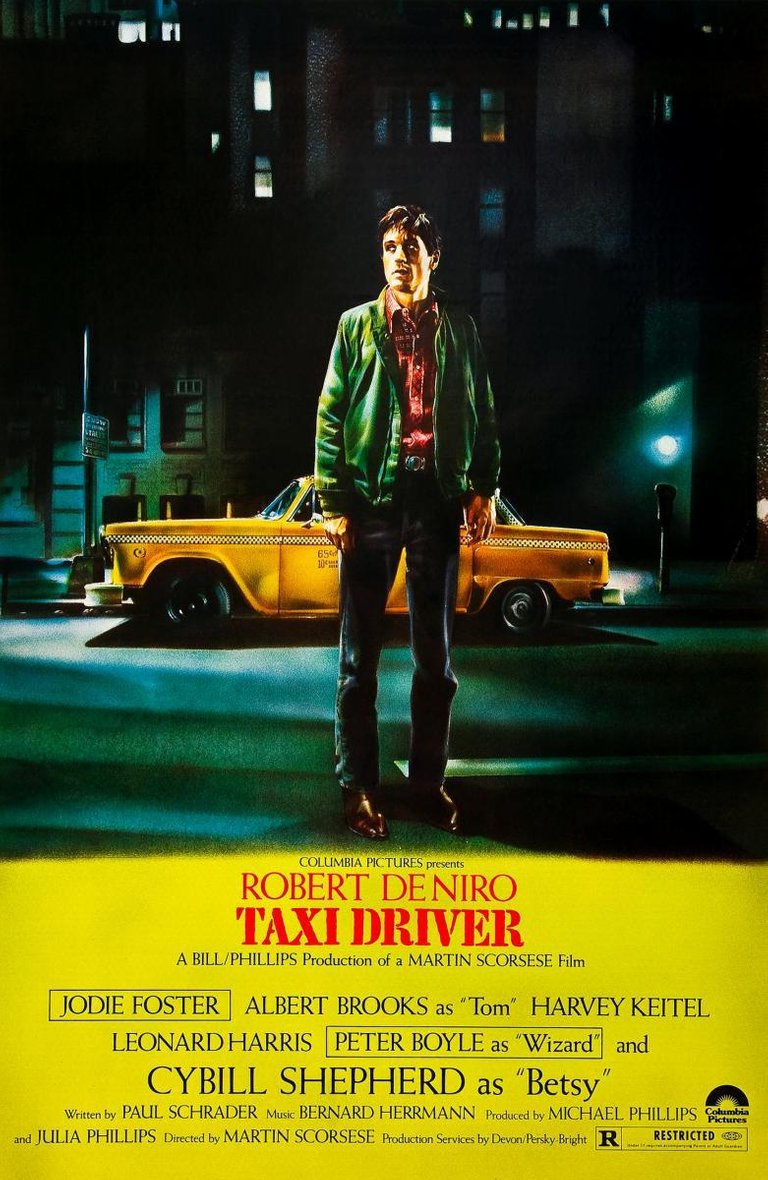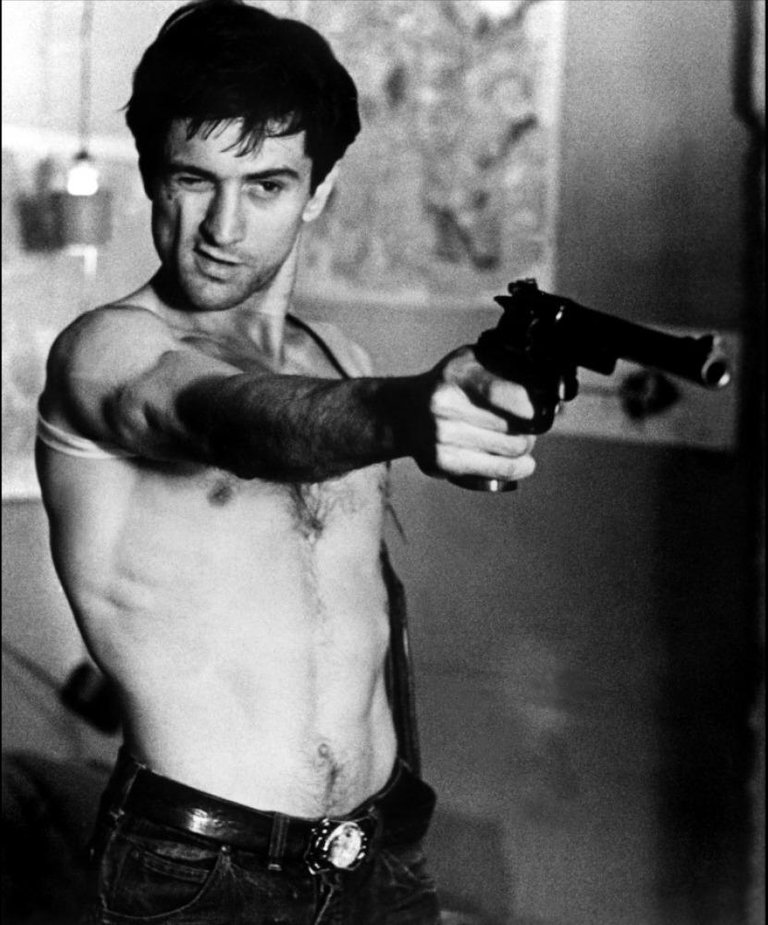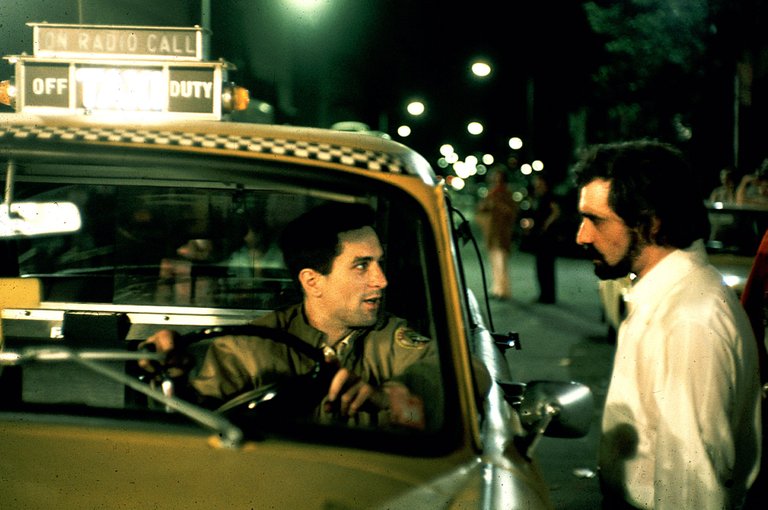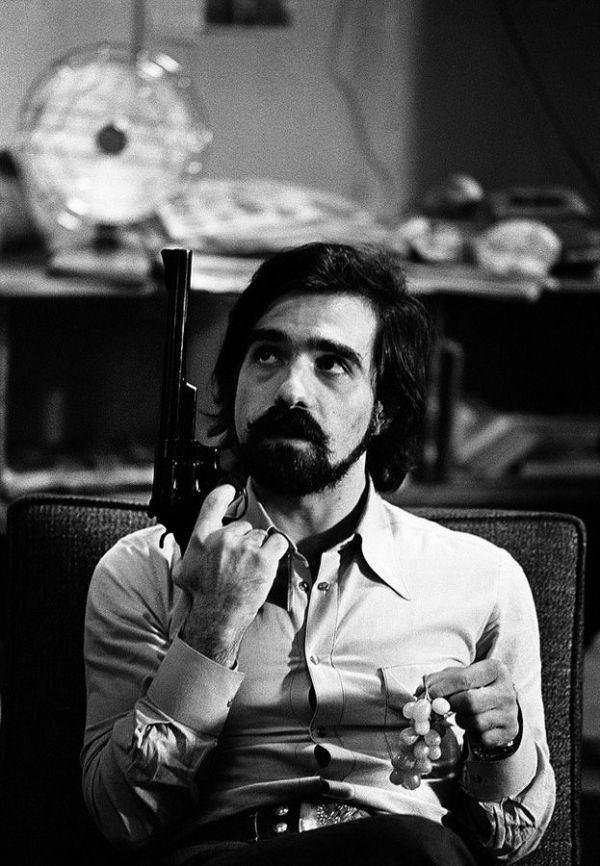
Dirigida por Matin Scorsese y protagonizada por Robert De Niro
At the end of the 1960s and early 1970s, a new generation of film directors who graduated from the university emerged in Hollywood (something unprecedented in the industry) who defined what would be the history of the seventh art from then on. Known as the Movie brats, names like George Lucas, Steven Spielberg, Francis Ford Cooppola, Brian De Palma and Martin Scorsese, among others, belonged to this group.
Al final de los años sesenta, principios de los setenta, surgió en Hollywood una nueva generación de directores de cine graduados en esa carrera en la universidad (algo sin precedentes en la industria) que definieron lo que sería la historia del séptimo arte de allí en adelante. Conocidos como los Movie brats, pertenecían a este grupo nombres como George Lucas, Steven Spielberg, Francis Ford Cooppola, Brian De Palma y Martin Scorsese, entre otros.
Today we all know those names, but at that time these directors were very young and dedicated themselves to making films with a different approach from the generation that preceded them. Influenced by French cinema, wanting to make movies to their liking and not according to the demands of the studios, it was a generation that loved making movies as much as watching them. At present they are indisputable references, examples to follow, but before the Oscar for The Departed, before Gangs of New York and his other films with Leonardo Di Caprio, before Casino and Goodfellas, even before Raging Bull, Martin Scorsese would bequeath to the world the film that took him to the status of cinema genius and earned him international recognition. He had already done some movies and had received good reviews, he had even collaborated with a very young Robert De Niro and Harvey Kittel, but Taxi Driver changed everything. It was a before and after not only in Martin Scorsese's career but also in American culture and in the history of cinema. A classic of classics, one of Quentin Tarantino's favorites, I read about this feature film last week both in Tarantino's own book Cinema Speculation and in a post by @irvinc so I decided to watch it again to express my opinion about it.
Hoy día todos conocemos esos nombres, pero para aquel momento estos directores eran muy jóvenes y se dedicaban a hacer películas con un enfoque diferente al de la generación que los precedió. Influidos por el cine francés, con ganas de hacer películas a su gusto y no de acuerdo a las exigencias de los estudios, fue una generación que amaba hacer cine tanto como verlo. En la actualidad son referentes indiscutibles, ejemplos a seguir, pero antes del Oscar por The Departed, antes de Gangs of New York y sus otras películas con Leonardo Di Caprio, antes de Casino y Goodfellas, incluso antes de Raging Bull, Martin Scorsese legaría al mundo la película que lo llevó al status de genio del cine y le labró el reconocimiento internacional. Ya había hecho algunas películas y había recibido buenas críticas, incluso ya había colaborado con un jovensísimo Robert De Niro y con Harvey Kittel, pero Taxi Driver lo cambió todo. Fue un antes y un después no sólo en la carrera de Martin Scorsese sino también en la cultura americana y en la historia del cine. Clásico de clásicos, uno de los favoritos de Quentin Tarantino, leí sobre este largometraje la semana pasada tanto en el libro Cinema Speculation del propio Tarantino como en un post de @irvinc así que decidí a verla de nuevo para expresar mi opinión al respecto.
The protagonist of the story is Travis Bickle (Robert De Niro) a US Marine who has returned from Vietnam and who suffers from such chronic insomnia that his way of fighting it is to take advantage of those hours, if I'm already awake, better make some money, right?, so he starts working as a taxi driver during the nights of a dangerous and wild New York. Travis is not very sociable, he has no communication skills, he goes during the day to watch porn movies in movie theaters of this type and drives through Harlem, Manhattan, Queens... let's just say that they are not the appropriate places to meet someone or make friends.
El protagonista de la historia es Travis Bickle (Robert De Niro) un Marine de los EEUU que ha vuelto de Vietnam y que padece de un insomnio tan crónico que su manera de combatirlo es aprovechar esas horas, si ya estoy despierto, mejor trabajar, ¿no?, así que comienza a trabajar como taxista durante las noches de un Nueva York peligroso y salvaje. Travis es muy poco sociable, no tiene habilidades comunicativas, va durante el día a ver películas porno a las salas de cine de este tipo y maneja por Harlem, Manhathan, Queens... digamos que no son los espacios apropiados para conocer a alguien o hacer amigos.
However, in a brave mix of stalking and romance, Travis takes an interest in Betsy (Cybill Shepherd), a very attractive woman who volunteers for a presidential candidate's political campaign. I confess that the way in which Travis approaches her, direct, with some humor and holding the gaze of a girl who - we thought - would never notice someone like him, makes us think that perhaps there's a love story in the midst of so much insomnia and so many hours on board the wheel. Now, beyond Betsy, what really occupies Travis's mind is how deteriorated the city and society are. Thieves, prostitutes, pimps, corrupt politicians, smelly alleys, sex trade, violence, New York seems to Travis an abyss of misery and putrefaction and somewhere he tells another character that "Someone has to do something" about it. After a series of events and a tension that gradually escalates, it is he himself who will do it.
Sin embargo, en un derroche de valentía que mezcla acoso y romance, Travis se interesa en Betsy (Cybill Shepherd), una mujer muy atractiva que trabaja como voluntaria en la campaña política de un candidato presidencial. Confieso que la forma en que Travis la aborda, directo, con algo de humor y sosteniendo la mirada de una chica que - pensamos- jamás se fijaría en alguien como él, hace pensar que quizás haya una historia de amor en medio de tanto insomnio y tantas horas a bordo del volante. Ahora bien, más allá de Betsy, lo que verdaderamente ocupa la mente de Travis es lo deterioradas que están la ciudad y la sociedad. Ladrones, prostitutas, chulos, políticos corruptos, callejones malolientes, comercio sexual, violencia, Nueva York le parece a Travis un abismo de miseria y putrefacción y en alguna parte le dice a otro personaje que "Alguien tiene que hacer algo" al respecto. Tras una serie de eventos y una tensión que va escalando gradualmente, es él mismo quien lo hará.
I learned from Tarantino's book that Paul Schrader was a film critic, an admirer of Brian De Palma (Sisters, Carrie, Scarface) and it was to him that he first showed the script for what would become Taxi Driver, but De Palma didn't want to do it and recommended it to Scorsese. The rest is history. Both Scorsese and Schrader saw the script as a remake of John Ford's The Searchers and the thematic similarities are obvious, but one of the most notable aspects is the way in which the grief of Travis, the protagonist, evolves. Not very socially adept, reclusive, a bit naive (he keeps a diary that no one ever reads), and racist, but also somewhat charming, Travis begins to show signs that something is breaking inside of him. The disappointment in love with Betsy, meeting the presidential candidate, hearing his speeches, listening to anecdotes from his classmates and of course the meeting with Iris, the pre-adolescent prostitute played by the always talented Jodie Foster, are facts that move the gears in Travis's mind and lead him to the climax of the film, one of the most memorable action sequences of the era and of cinema history.
Por el libro de Tarantino supe que Paul Schrader era un crítico de cine, admirador de Brian De Palma (Sisters, Carrie, Scarface) y fue a él a quien primero le mostró el guión de lo que sería Taxi Driver, pero De Palma no quiso hacerlo y se lo recomendó a Scorsese. Lo demás es historia. Ambos, Scorsese y Schrader vieron el guión como un remake de The Searchers de John Ford y las semejanzas temáticas son evidentes, pero uno de los aspectos más detacados es la forma en que evoluciona el pesamiento de Travis, el protagonista. Poco hábil socialmente, solitario, un poco ingenuo (lleva un diario que al final nadie lee) y racista, pero también algo encantador, Travis comienza a dar señales de que algo se está quebrando dentro de él. La decepción amorosa con Betsy, el conocer al candidato presidencial, oír sus discursos, escuchar anécdotas de sus compañeros y por supuesto el encuentro con Iris, la prostituta preadolescente interpretada por la siempre talentosa Jodie Foster, son hechos que van moviendo los engranajes en la mente de Travis y lo conducen al clímax de la película, una de las secuencias de acción más memorables de la época y de la historia del cine.
Winner of the Palme d'Or at the Cannes Film Festival in 1976, Taxi Driver elevated Martin Scorsese's status to a new level, cementing Robert De Niro (who had just received an Oscar for his role in The Godfather . Part II), earned Jodie Foster a BAFTA and carved out a place of honor in film history. It is a classic of classics, because of the script, because of the performances, because of Scorsese's cameos, because of the camera sequences aboard a taxi that allows us to explore the New York nights, because of the first-person perspective of a protagonist who, with his many flaws, it becomes a "hero" because of the violent climax sequence, because it took Scorsese to Olympus in Hollywood, because it is a cult film considered "culturally, historically, and aesthetically significant" by the Library of Congress in the USA and because it narrates the loss of innocence (Travis's, not Iris's) in an increasingly deteriorated society, Taxi Driver is a movie that must be seen or must be put in the first places of the to-watch list and the good thing is that it's available on Netflix so there's no excuse not to watch it, how many of you have seen it? I read you in the comments.
Ganadora de la Palma de Oro del Festival de Cannes en 1976, Taxi Driver elevó el status de Martin Scorsese a un nuevo nivel, consolidó a Robert De Niro (quien acababa de recibir el Oscar por su papel en The Godfather. Part II), le valió un BAFTA a Jodie Foster y se labró un lugar de honor en la historia del cine. Es un clásico de clásicos, por el guión, por las actuaciones, por los cameos de Scorsese, por las secuencias de cámara a bordo de un taxi que nos permite recorrer las noches neoyorquinas, por la perspectiva en primera persona de un protagonista que con sus muchos defectos se convierte en un "héroe", por la violenta secuencia del clímax, porque llevó a Scorsese al Olimpo de Hollywood, porque es una película de culto considerada como "cultural, histórica y estéticamente significativa" por la Biblioteca del Congreso de los EEUU y porque narra la perdida de la inocencia (de Travis, no de Iris) en una sociedad cada vez más deteriorada, Taxi Driver es una película que hay que ver o hay que poner en el primer lugar de la lista de pendientes y lo bueno es que está disponible en Netflix así que no hay excusa para no verla, ¿cuántos de ustedes la han visto? Los leo en los comentarios.
Reviewed by | Reseñado por @cristiancaicedo
Other posts that may interest you | Otros posts que pueden interesarte:
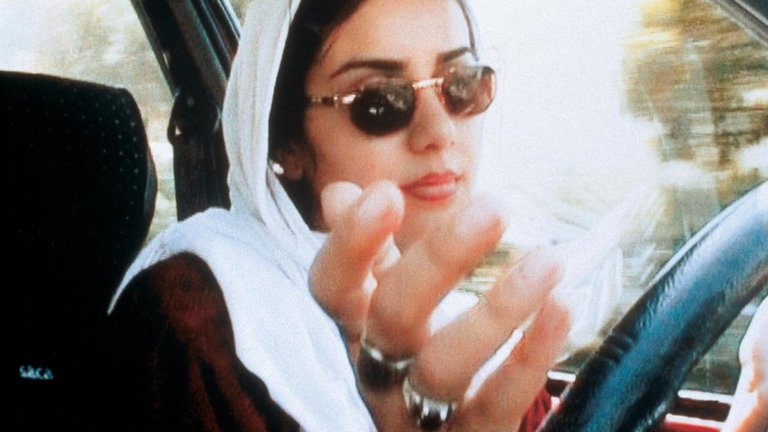 |
|---|
